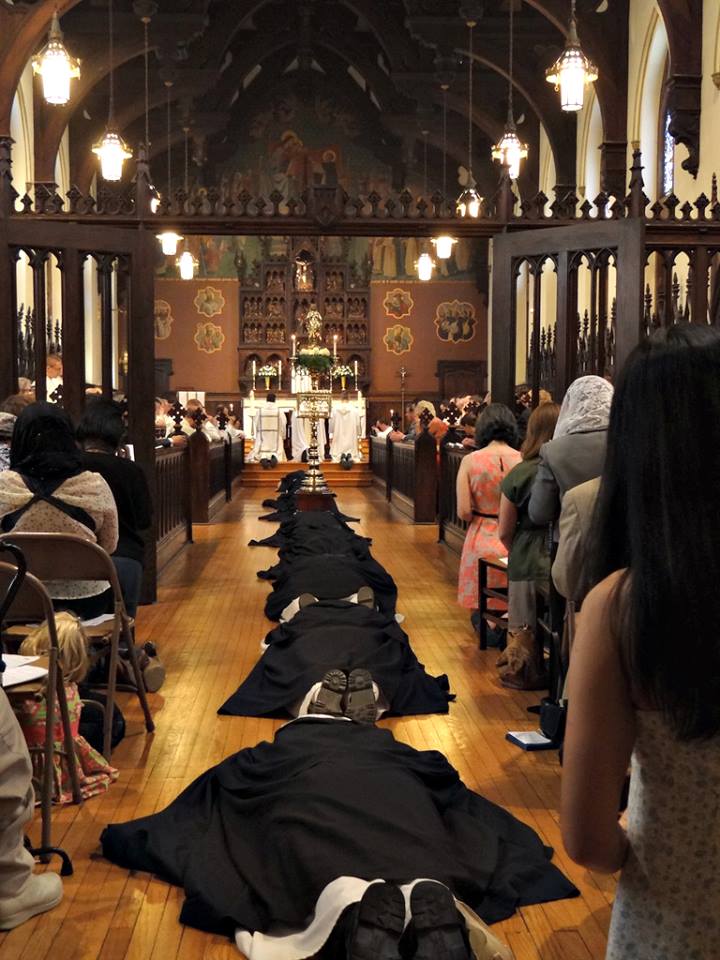In the Dominican tradition, even though voluntarily wishing to live the evangelical vows of poverty, celibacy, and obedience, only one vow is taken. You guessed it, obedience. The one I struggle with most.
Three months before my temporary vows of three years, it was as if God had spoken directly to me. It wasn’t a decision I reasoned into myself. I don’t know how better to describe it than that. Holy Thursday night I went to bed. Good Friday morning I woke up with perhaps the strongest conviction I may have ever had to date. I must go. Spooky.
Lying prostrate on the floor of the Church before the altar, and then kneeling before the superior, my hands in his, saying “I, Brother Matthew Paul (I would have liked this, the same as my baptismal name because St Dominic carried two texts. You guessed it, the Gospel of Matthew and the letters of St Paul with him at all times; the only two. Choosing a religious name is no longer strictly your novice master’s decision. Supposedly, the candidate submits three suggestions and the novice master and the novice “discern” together. I don’t know how this really works in practice. Never made it that far.)…make profession and promise obedience (facio professionem & promitto obedientiam) to God and to Blessed Mary and Blessed Dominic and to you (Name), (Title), and to (Name), the Master General of the Order of Friar Preachers, and your successors, according to the Rule of Blessed Augustine and the Institutions of the Friars Preachers, that I will be obedient (ero obediens) to you and to your successors until (temp = time period, perpetual = “unto death/usque ad mortem”). (nb Phil 2:8)

-by Br John Sica, OP
“Riding the metro this summer, I saw some young men with t-shirts that proclaim: “Obey.” Presumably (and here I speculate), it’s a sarcastic jab at supposedly traditional and conservative values, a statement just as likely to come from someone who would proclaim, “question authority!”
This leads me to wonder: what do these young men think when they pass someone– like myself– in garb which symbolizes a very traditional kind of obedience? As all the world knows, we practice a very particular kind of authority to a very crusty, old institution. “I, Brother John, make profession and promise obedience…”
Georgetown’s Center for Applied Research in the Apostolate (CARA) recently inquired about women’s attitudes on joining religious life. One of the personal comments exemplifies an attitude which, I think, sums up this negative view of obedience. When a woman was asked why she was not interested in being a sister, she replied, “I’m not willing to be totally submissive to the rules and obligations of the order’s leader.” Now, there’s an objection! Perhaps this could be the heart of their possible objection. Obedience, described as a repression of individuality and abandonment of responsibility, hardly seems virtuous.
The Scriptures, though, speak of obedience and disobedience in the context of the fall of man. Our first parents, in an act of disobedience, tried to seize what was proper to God. The Catechism summarizes and explains the Church’s teaching on the fall:
“He [i.e., Adam] chose himself over and against God, against the requirements of his creaturely status and therefore against his own good. Created in a state of holiness, man was destined to be fully ‘divinized’ by God in glory. Seduced by the devil, he wanted to ‘be like God,’ but ‘without God, before God, and not in accordance with God.’ (CCC 398)”
From the beginning God destined man to share in the gift of divine life, to be “divinized.” The fault of our first parents lies not in wanting the fullness of life and goodness, but in wanting it apart from God — a metaphysical and moral absurdity. God, although all-powerful, cannot make a creature that is not totally and utterly dependent on Him.
It is ironic: seeking the fullness of life apart from God, they grasped as fruit only death. St. Paul, that inspired interpreter of salvation history, sums up the fall of Adam and Christ’s redemption in this way: “For as by one man’s disobedience many were made sinners, so by one man’s obedience many will be made righteous” (Rom 5:19). And he offers us a corresponding irony: Christ, submitting Himself obediently to death (cf. Phil 2:8), won life and salvation for all men.
I suspect that many resent obedience because they see it as a restriction of what is good in life. There is a sense in which the initial objection is true: there is a necessity of true death to self in order to live to Christ. This is why Christ says, “enter by the narrow gate… for the gate is narrow and the way is hard, that leads to life, and those who find it are few” (Matt 7:13-14). But for those who do enter by the narrow gate, Christ also tells us that “if any one enters by me, he will be saved, and will go in and out and find pasture” where we will “have life, and have it abundantly” (Jn 10: 9-10). Our obedience takes the pattern of Christ’s, which bears fruit only in death and leads to true freedom in eternal life, for “Truly, truly, I say to you, unless a grain of wheat falls into the earth and dies, it remains alone; but if it dies, it bears much fruit” (Jn 12:24).
-Dominican House of Studies, Washington, DC, solemn vows
Love,
Matthew


